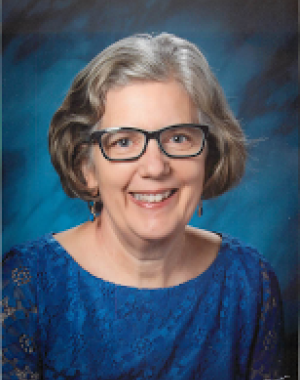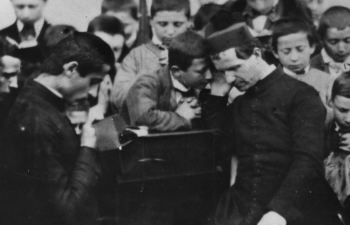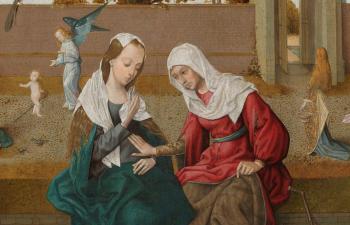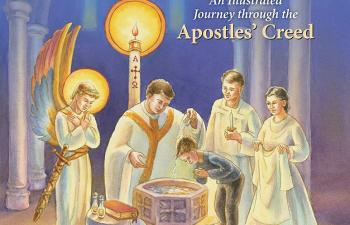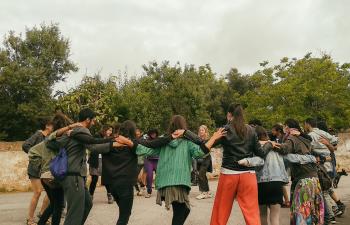 In prayer after receiving Holy Communion, I recognized in my heart the voice of God the Father. “I want you to be radically available.” As Director of Religious Education in a large parish, I had an idea of what it meant to be radically available while working full time. It meant being available to God by showing up for daily Mass and prayer. It meant being available to my family for quick phone calls or spontaneous lunch meetings and for celebrations and vacations. It meant planning ahead but holding my plans loosely so I was interruptible. It meant keeping my office door open, welcoming parents or catechists who needed to talk.
In prayer after receiving Holy Communion, I recognized in my heart the voice of God the Father. “I want you to be radically available.” As Director of Religious Education in a large parish, I had an idea of what it meant to be radically available while working full time. It meant being available to God by showing up for daily Mass and prayer. It meant being available to my family for quick phone calls or spontaneous lunch meetings and for celebrations and vacations. It meant planning ahead but holding my plans loosely so I was interruptible. It meant keeping my office door open, welcoming parents or catechists who needed to talk.
Available to Rest in God’s Love
But why, I wondered, did God speak this phrase to me as I was retiring? I concluded that I was not to make any ongoing volunteer commitments but to trust God to lead me each day. For a couple of weeks, I delighted in unhurried phone conversations, invitations to travel, writing letters, cleaning neglected closets and corners, and catching up with friends over coffee after morning Mass.
Yet, I wondered, had I rightly understood the call to radical availability? Wasn’t it selfish of me to say no when my calendar was empty and I was qualified to help? What if I was taking the idea of radical availability too far? When I took my doubts to my husband and my spiritual director, they affirmed my discernment and encouraged me to stay the course.
Like Jesus’s friend Martha of Bethany, I used to think that loving God meant spending myself entirely for others. Martha served Jesus and others, but perhaps she did so at the expense of her full commitment to God, withholding her whole self from him. Now I was learning, like Martha’s sister, Mary, to simply rest in his love—to receive each day as a gift from him, to allow him to love me.
Several invitations to volunteer arose over the following weeks. Would I volunteer as a weekly catechist? Be a sponsor? Join a prayer team one Friday a month?
While the need for volunteers was urgent, I remembered my yes to the Lord and said no to each plea for help. Beginning my day in our prayer room, I walked to Mass and back. We traveled to celebrate Thanksgiving with family for the first time in years. I basked in the daily luxury of unrushed time.
After three months, I noticed a desire in my heart to serve on a particular retreat. Knowing that the team for the retreat was in place and that another opportunity wouldn’t be available for a few months, I prayed, “Lord, I trust that if this desire is from you, you will bring it to fulfillment in your time. If someone asks me to serve, I will.” That evening, a leader called to ask me to serve on the retreat, which was only a month away. A nun who had agreed to serve was unavailable after all. Feeling unprepared, yet confident that God wanted me on the team, I responded with an enthusiastic “Yes!”
Available to Suffer with Christ
Twenty-four hours later, my heart was pierced with unspeakable sorrow when our youngest son was involved in a tragic accident while rafting on a Guatemalan river. Rescue searchers found his body in the river two days later.
“Whoever loves father or mother more than me is not worthy of me, and whoever loves son or daughter more than me is not worthy of me; and whoever does not take up his cross and follow after me is not worthy of me” (Mt 10:37–38). The “all in” demand of Christ is clear in these verses. It would be an abhorrent demand coming from anyone other than Jesus. We are blind, but he sees that when we refuse to take up the cross and follow him, we cling to our family relationships in unhealthy ways. Without the cross of Christ, the family, an image of the Holy Trinity, fractures. Each member turns in on himself, forgetting his dignity and worth. The shocking demand of these words hides an invitation. It’s an invitation to love from love himself. Jesus wants his beloved followers to journey with him. He invites us to share in the unfathomable mystery of his love as he pours himself out in gift on the Cross.
How could I, even in my grief, not respond to Christ’s invitation? Although the weight of the cross threatened to crush me, I heard him whisper, “Let’s do this together.” He wept with me, watched through sleepless nights with me, prayed with me, remained with me—radically available. “As the Father loves me, so I also love you. Remain in my love. If you keep my commandments, you will remain in my love, just as I have kept my Father’s commandments and remain in his love. I have told you this so that my joy may be in you and your joy may be complete” (Jn 15:9–11).
The truth that Jesus remains with us, especially when we are at our worst, deeply consoles us. When we are too heartsick to form cohesive thoughts, Jesus remains with us in the Eucharist, in the Sacred Scripture, and in the kindness of family and friends. He stays and weeps with us and listens to us recount as many times as needed our grief and sorrow. Whether we’re sad or angry or alone, or dancing for joy, he draws us deeper into his Most Sacred Heart. He desires that we stay so he can enfold all the experiences of our lives with his. Like the mingling of the water and wine in the preparation of the chalice at Mass, Jesus wants us to bring our joys and sorrows to mingle with his in the life-giving receptacle of his Most Sacred Heart.
Available for New Life in Christ
In retrospect, it’s clear that God’s earlier call to radical availability was preparation for days of intense grief. With a clear calendar, I could receive the comforting space of our prayer room and the embrace of family and friends. My view of God’s love and mercy was exponentially expanded. No longer able to deny my own need for rest and privacy, I entrusted everything, including my family and their responses, into God’s loving care.
While I’d been worried about saying no to urgent needs, God knew what I’d need most. Less than a month after our son’s funeral, I served on the retreat to which I had joyfully said yes. The decision to help others process grief and trauma while dealing with my own grief demonstrates the Holy Trinity’s radical availability to me. Far from exhausting me, the work rejuvenated me physically and spiritually. In solidarity with others, I renewed my commitment to unite my suffering with the sufferings of Christ and remembered the truth about our participation in the Passion, death, and Resurrection of Jesus. It was life-giving work, exactly what I needed. None of this would have happened had I said yes to those urgent needs earlier.
The months that followed our son’s death brought big changes, including my husband’s retirement; an interstate move to live next door to our daughter, her husband, and their nine children; and the addition of two of our adult children to our once “empty nest.” Our whole family grieved, not one of us immune. Suffering reveals the fragility and limits of our humanity. Temptations to despair, or to judge ourselves unfit to love and be loved, inevitably intrude during severe and ongoing suffering. Brain fog sets in, making us more forgetful than usual. We may be unable to force our exhausted bodies to keep up our former pace. The enemy of our souls seizes this opportunity to tempt us with doubts about all we once knew to be certain. We wonder if God is listening, if we have hoped in vain, if we will ever know joy again. It’s precisely then that we most need one another and the remedy Christ offers in the Eucharist.
This new season of life has brought daily opportunities to serve our immediate family. I live my commitment to radical availability in new ways. Our new parish was looking for a DRE, but I knew not to apply. Instead, amid a kitchen remodel, I plan and prepare meals for a household of four, I care for my youngest granddaughter to give her mom a few precious moments to work uninterrupted, and I read and write as much as time and energy allow. My husband and I have also answered the call to speak at special events.
When we’re “rooted and grounded in love” (Eph 3:17), no matter how full or empty our calendars, radical availability is possible. If we draw our sustenance from the infinite well of Christ’s love for us, we can be confident that he will give us everything we need to accept his gifts and invitations each day. Let’s make it our aim to receive each day, with its accompanying joys and sorrows, as a gift, and strive to remain in Christ, radically available.
Lani Bogart served as a catechetical leader in the diocese of Phoenix for 26 years. She recently moved to Houston, Texas, with her deacon husband and an adult son and daughter, where they live near their daughter, son-in-law, and nine grandchildren. Lani holds an MA in Theology and Christian Ministry and edits and contributes regularly to Blessed Is She.
This article originally appeared on pages 26-27 of the printed edition.
Art credit: Barbara Jackson, Pixabay.com
This article is from The Catechetical Review (Online Edition ISSN 2379-6324) and may be copied for catechetical purposes only. It may not be reprinted in another published work without the permission of The Catechetical Review by contacting [email protected]


